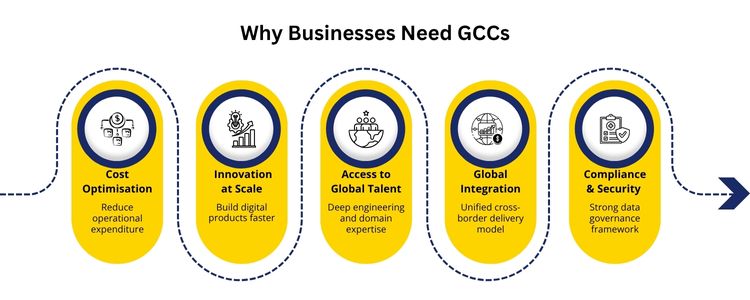
In the contemporary globalised world, businesses are constantly looking for new and improved ways to stay ahead of the competition. A powerful approach to achieving these goals is the establishment of a Global Capability Centre (GCC).
Suppose that a big multinational corporation, which is located in the United States, requires a team which has to concentrate on the development of sophisticated software, analysis of information and budgeting. It will not base this team in its home country, because it is expensive, but in a country such as India, where a fully owned center is established at a lower cost. This center is not a foreign company but a section of the parent organisation. This local centre is a Global Capability Center (GCC). To put it simply, a GCC is an internal center of a multinational corporation, which is situated in another country, and is intended to capitalise on local talent and expertise to carry out essential business operations. Those are not mere offices of support; those are strategic partners that make the whole global enterprise grow in terms of innovation and core activities.
The idea of GCC has changed considerably. Originally, these centers were commonly referred to as Shared Service Centers and had concentrated more on the routine and transactional activities such as payroll processing and IT helpdesk services, and the primary objective was cost reduction. The current GCC has today developed into an excellence center. It has highly skilled personnel who handle the most vital projects of the company, including The GCC model offers a special combination of strategic control, cost-effectiveness, and recourse to a rich pool of world talent.
India has now become the leading destination of GCCs in the world. There are more than 1,900 centers of this type in the country, which have over 1.9 million professionals. These centers play pivotal roles in the Indian economy, and they are an important source of innovation to their parent companies. Such urban centers as Bengaluru, Hyderabad, Pune, Gurugram, and Chennai have turned into the key GCC centers, where corporations related to the highest-quality technology, finance, engineering, and retail have invested. The success of GCCs in India is a testimony to the high talent pool in the country, good educational infrastructure, and favorable business environment.
Three main steps can be used to describe how the GCCs arrived at their current strategic position: 1. The 1990s – Early 2000s: The Cost-Centric Era. Model: Shared Service Centers (SSCs). Focus: Standardization and concentration of routine, high-volume administrative functions (e.g. finance, human resources, and IT support). Driver: The main motivating force was cost saving with the help of labour arbitrage, which is the same work at a cheaper price. 2. The Mid-2000s – 2010s: The Efficiency Era Model: Offshore Capability Centres or Global In-house Centres (GICs). Focus: While continuing with the less complicated activities, one shifts to the more sophisticated processes such as software development, engineering design and research. It changed its agenda to quality, efficiency, and compliance. 3. 2010s-2019: The Era of Strategic Partnership. Model: Global Capability Centers (GCCs). Focus: Proprietorship and creativity. GCCs now dominate the complete product development cycles, digital transformation, and the generation of intellectual property (IP) in such domains as AI, Cloud, and Analytics. They are part of the essential company strategy.
The benefits of the GCC formation in India are both varied and offer both concrete and strategic benefits.
The GCC is not a luxury in the present business environment marked by a fast pace of digital change and worldwide competition. To sum up, the Global Capability Center is currently much more than a mere offshore unit. It is a visionary planner of the future organization. For a multinational company that intends to dominate the market, investing in GCC is a conclusive strategy to develop a stronger, creative, and competitive international organization.
Financial advisory business model is a good venture that entrepreneurs can take. With a proper niche definition, required certification, technology exploitation and keeping up with market trends, you will be able to create a successful and sustainable financial advisory business. Taking advantage of cross-border financial services can also increase the growth and expansion of your firm.
The most important step you can take today for starting your business is to do some research on your target market and get the necessary certifications and a solid business plan. Inductus Group, a financial advisory company, can succeed in this volatile industry for you through experts, hard work and proper strategic planning.
A GCC is an offshore facility of a multinational company that undertakes niche roles such as research and development, information technology service and strategic management. It is a government program that gives the women entrepreneurs up to 1 crore in bank loans to fund greenfield projects. Personal responsibilities and unconscious bias are the factors that lead to their mid-career attrition and slow them down in their careers. They introduce new ideas, understanding, and team-oriented leadership that speeds up the advancement of such areas as AI and cybersecurity. By 2030, women are expected to take up 25-30 per cent of GCC leadership positions, which will be paramount to the growth of the Indian market. Aditi, with a strong background in forensic science and biotechnology, brings an innovative scientific perspective to her work. Her expertise spans research, analytics, and strategic advisory in consulting and GCC environments. She has published numerous research papers and articles. A versatile writer in both technical and creative domains, Aditi excels at translating complex subjects into compelling insights. Which she aligns seamlessly with consulting, advisory domain, and GCC operations. Her ability to bridge science, business, and storytelling positions her as a strategic thinker who can drive data-informed decision-making.
What is a Global Capability Centre (GCC)?
Developing the Modern GCC

India GCCs: An International Power
History of the GCC
The Benefit of GCCs in India
What India Has To Offer To A Business
The Significance Of A GCC In Today's Business
Conclusion
frequently asked questions (FAQs)

Aditi
Hey, like this? Why not share it with a buddy?
Related Posts
Recent Blog / Post
- Policy and the Multi-City GCC Grid: Catalyzing India’s Next Wave of Global Capability December 6, 2025
- BFSI GCC Digital Transformation: Moving from Back Office to Front-Line FinTech Innovation. December 6, 2025
- Pharma Global Capability Centers: Accelerating Drug Discovery with Computational Chemistry December 6, 2025
- Capability’ and ‘Sustainability’ as the New Twin Drivers of GCC 3.0 December 4, 2025
- Beyond Cost: Using Value-Per-Employee (VPE) as the New Metric for GCC Cost Optimisation. December 3, 2025
- From Cost Arbitrage to Global Chip Architect: Securing India’s Tech Future December 2, 2025
- The Great Reskilling Challenge: Preparing the Workforce for GCC Digital Transformation by 2025 December 2, 2025
- Semiconductor Geopolitics: The Strategic Impact on Automotive and Electronics Offshore Development Centers. December 1, 2025
- The GCC Innovation Centre Accelerating Digital Twins for Global Asset Modelling. December 1, 2025
- Gen AI in GCCs: Moving from Pilot Projects to Enterprise-Wide Industrialization. November 29, 2025
- The Evolution of GCC Security: From Perimeter Defence to Zero-Trust Architecture November 29, 2025
- Banking GCCs and the Rise of Open Finance Platforms November 27, 2025
- EdTech GCCs: Global Learning Labs for AI-Powered Education November 27, 2025
- Managing Compliance and Quality in the Gig Economy within a Captive Delivery Centre. November 26, 2025
- Implementing Zero-Trust: A Security Blueprint for Modern GCC Business Operations in India November 26, 2025
















